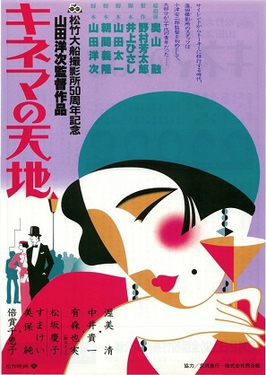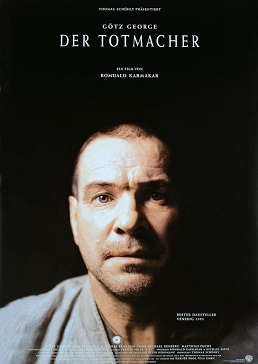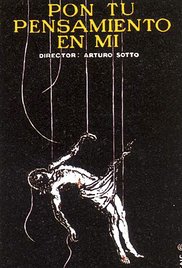The Golden Globe Award for Best Animated Feature Film is a Golden Globe Award that was awarded for the first time at the 64th Golden Globe Awards in 2007. It was the first time that the Golden Globe Awards had created a separate category for animated films since its establishment. The nominations are announced in January and an awards ceremony is held later in the month. Initially, only three films were nominated for best animated film, in contrast to five nominations for the majority of other awards. The Pixar film Cars was the first recipient of the award.

Untameda.k.a.Untamed Woman is a 1957 Japanese drama film directed by Mikio Naruse. It is based on a novel by Shūsei Tokuda.
Lake of Tears is a 1966 Japanese film directed by Tomotaka Tasaka. It was Japan's submission to the 39th Academy Awards for the Academy Award for Best Foreign Language Film, but was not accepted as a nominee.

Mt. Hakkoda is a 1977 Japanese film directed by Shirō Moritani. Based on the novelist Jirō Nitta's recounting of the Hakkōda Mountains incident, the film tells the story of two infantry regiments of the Imperial Japanese Army, consisting of 210 men, that tried to traverse the Hakkōda Mountains in the winter of 1902, in preparation for the anticipated Russo-Japanese War. The film was Japan's submission to the 50th Academy Awards for the Academy Award for Best Foreign Language Film, but was not accepted as a nominee.

Final Take is a 1986 Japanese drama film directed by Yoji Yamada. It was Japan's submission to the 59th Academy Awards for the Academy Award for Best Foreign Language Film, but was not accepted as a nominee.

Hope and Pain is a 1988 Japanese film directed by Yoji Yamada. It was Japan's submission to the 61st Academy Awards for the Academy Award for Best Foreign Language Film, but was not accepted as a nominee. It was also entered into the 39th Berlin International Film Festival.

I Just Didn't Do It is a 2007 Japanese film directed by Masayuki Suo, starring Ryo Kase, Asaka Seto and Kōji Yakusho. It was selected as the Japanese entry for the Best Foreign Language Film at the 80th Academy Awards, but it was not nominated.

Deathmaker is a 1995 German film directed by Romuald Karmakar and starring Götz George, Jürgen Hentsch and Pierre Franckh. The film is based on the transcripts of the interrogation of the notorious serial killer Fritz Haarmann.

A Class to Remember is a 1993 Japanese film directed by Yōji Yamada. It was chosen as Best Film at the Japan Academy Prize ceremony.

Hamsun is a 1996 internationally co-produced drama film directed by Jan Troell and written by Per Olov Enquist, about the later life of the Norwegian author Knut Hamsun, who, together with his wife Marie Hamsun, went from being a national hero to a traitor after supporting Nazi Germany during their occupation of Norway during World War II.
Nausikaya (Nausikaja) is a 1995 Croatian film directed, written and produced by Vicko Ruić. It is based on "The Spider", a horror short story by Hanns Heinz Ewers. The film was selected as the Croatian entry for the Best Foreign Language Film at the 69th Academy Awards, but was not accepted as a nominee.
Kolonel Bunker is an Albanian, French and Polish historical film released in 1996. It was selected as the Albanian entry for the Best Foreign Language Film at the 69th Academy Awards, but was not accepted as a nominee.
Not Me! is a Canadian drama film, released in 1996. The full-length directorial debut of Pierre Gang, the screenplay had been written by Gang a full 10 years before he was able to make the film. The film was selected as the Canadian entry for the Best Foreign Language Film at the 69th Academy Awards, but was not accepted as a nominee.
Hi Cousin! is a 1996 Algerian comedy film directed by Merzak Allouache. The film was selected as the Algerian entry for the Best Foreign Language Film at the 69th Academy Awards, but was not accepted as a nominee.
Hannah is a 1997 Austrian thriller film directed by Reinhard Schwabenitzky. The film was selected as the Austrian entry for the Best Foreign Language Film at the 69th Academy Awards, but was not accepted as a nominee.

Think of Me is a 1996 Cuban drama film written and directed by Arturo Sotto Díaz. The film was selected as the Cuban entry for the Best Foreign Language Film at the 69th Academy Awards, but was not accepted as a nominee.
Between Pancho Villa and a Naked Woman is a 1996 Mexican comedy film directed by Sabina Berman and Isabelle Tardán. The film was selected as the Mexican entry for the Best Foreign Language Film at the 69th Academy Awards, but was not accepted as a nominee.
Bwana is a 1996 Spanish drama film directed by Imanol Uribe. The film was selected as the Spanish entry for the Best Foreign Language Film at the 69th Academy Awards, but was not accepted as a nominee. The plot tracks an African immigrant and a Spanish family treating the former as if he were an alien.
Tonight Nobody Goes Home is a 1996 Taiwanese comedy film directed by Sylvia Chang. The film was selected as the Taiwanese entry for the Best Foreign Language Film at the 69th Academy Awards, but was not accepted as a nominee.









